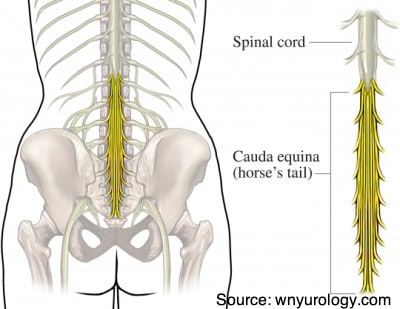Cauda Equina Syndrome (CES) is a condition that is often misdiagnosed. The syndrome occurs when the nerve roots of the cauda equina, which is the lowermost area of the spinal cord, are compressed. The spinal cord ends at the upper portion of the lumbar spine. Due to pressure on the lower nerve roots, motor and sensory functions may be disrupted as these nerve roots supply the lower extremities and the bladder.
CES is a rare condition but has serious consequences if not promptly treated. It is an acute condition that occurs suddenly, like a heart attack. Some signs and symptoms of Cauda Equina Syndrome are severe low back pain, numbness, or weakness in one or both legs, sensory loss or pain in one or both legs, loss of reflexes in extremities, and loss of bowel or bladder control.
To diagnose CES, doctors should look at medical history, complete physical examinations, and order an MRI. Misdiagnosed or untreated CES can not only affect people physically but emotionally as well. The severe pain can make everyday life highly difficult. It can be difficult to work, complete basic tasks, and enjoy the hobbies and activities injury victims once loved. It is important and necessary that the healthcare professional addresses and properly manages all difficulties and injuries associated with CES.
To understand more about Cauda Equina Syndrome and whether your doctor was negligent in diagnosing or managing it, contact an experienced Covington and Cincinnati medical malpractice attorney at TLF: The Medical Injury Law Firm for a free consultation today.

